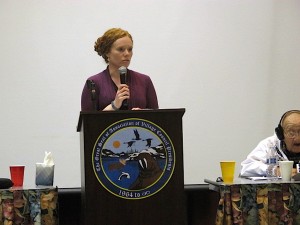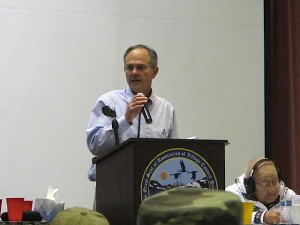Tribal co-management and Chinook bycatch took center stage Tuesday at a subsistence panel at the Association of Village Council Presidents conference.
Reflecting on a tense and important 2014 season, Cora Campbell, the Commissioner of the Alaska Department of Fish and Game thanked the packed room of Y-K Delta fishermen for their sacrifices.

“I want to start by complimenting you on the leadership and conservation ethics that people showed this season in understanding that the salmon needed to pass to the spawning grounds. Thank you for conserving chinook salmon,” said Campbell.
Federal managers controlled the Chinook fishery early in the summer. And if tribal leaders build on momentum to create Tribal Fish Commissions, there could soon be new management players. Sky Starkey is a longtime attorney for the AVCP and presented an aggressive timeline for bringing in voices.
“The overriding hope is that the tribes and the commission would meet together in the early spring and develop among themselves their ideas on how they want the rivers managed next year. Those tribal management plans for Chinook salmon will go to the Department and the Fish and Wildlife Service and be part of what happens for fishing next year,” said Starkey.
There are still many unresolved questions related to legal issues and funding the commissions. Starkey says one idea is to institute heavy fines on Pollock boats that catch Chinook salmon in their nets and use those funds for the commissions.

Bycatch was never far from panelist remarks. Commissioner Campbell touted the state’s efforts to push the North Pacific Fishery Management Council’s current study of possible steep reductions to Chinook bycatch limits.
“What we have heard is we want the burden of conservation to be shared amongst all users, what we’ve heard is that when we have restrictions in river, that we want other users to be contributing to the future of king salmon as well,” said Campbell.
Victor Joseph, CEO of the Tanana Chiefs Conference reminded the convention that the health of the fishery depends on the support of all users.
“We need to know what’s happening from a holistic viewpoint with this fish and our fisheries. When I’m looking at it whether it’s the federal government state, tribes at the table, all other concerned parties at the table, we need to find balance,” said Joseph.
Gene Peltola Junior from the Federal Office of Subsistence Management also spoke in the session.
Ben Matheson is a contributor with the Alaska Public Radio Network.




